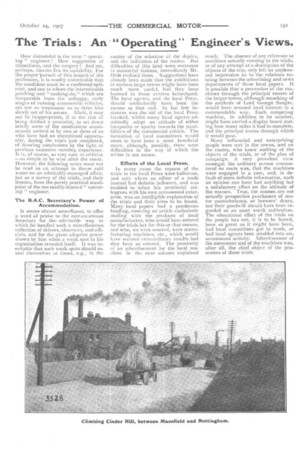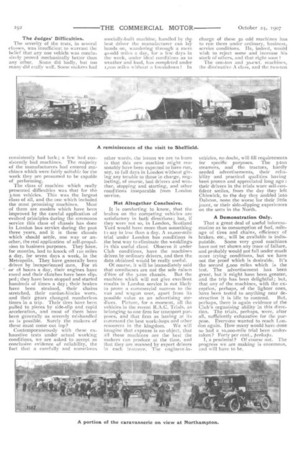The Trials : An "Operating" Engineer s Views.
Page 23

Page 24

If you've noticed an error in this article please click here to report it so we can fix it.
How distasteful is the term " operating ' engineer ! How suggestive of chloroform, and the surgery ! And yet, perhaps, therein lies its suitability. For the proper *pursuit of this branch of the profession, it is readily conceivable that the candidate must be a confirmed optimist, and one to whom the interminable patching and " making-do," which are inseparable from the unhappy, early stages of running commercial vehicles, are not so wearisome as to drive him slowly out of his senses. Albeit, it may not be inappropriate, if at the risk of being clubbed a pessimist, to set down briefly some of the conclusions unanimously arrived at by two or three of us who have had an exceptional opportunity, during the trials just completed, of drawing conclusions by the light of previous extensive running experience. It is, of course, so very easy to criticise —so simple to be wise after the event. However, the following notes must not be read as an attempt to throw cold water on an admirably-managed affair, but as a survey of the trials, and their lessons, from the purely practical standpoint of the too readily-blamed" operating " engineer.
The R.A.C. Secretary's Power of Accommodation.
It seems almost superfluous, to offer a word of praise to the ever-courteous Secretary for the,...thmirable way in which he handled such a miscellaneous collection of drivers, observers, and officials, and for the great adaptive power shown by him when a weak spot in his organisation revealed itself. It was inevitable that such weak spots should reveal themselves at times, e.g., in the
iflatter of the selection of the deperts, and the indication of the routes. But difficulties of this kind were overcome in masterful fashion, immediately Mr. Orde realised them. Suggestions have already been made that the exhibitions in various large towns might have been much more useful, had they been boomed in those centres beforehand. The local agents, and the local Press, should undoubtedly have been the means to that end. In but few instances was the aid of the local Press invoked, whilst many local agents admittedly adopt an attitude of either incapacity or apathy towards the possibilities of the commercial vehicle. The formation of local committees would seem to have been a most beneficial move, although, possibly, there were difficulties in the way of which the writer is not aware.
Efforts of the Local Press.
In many cases the reports of the trials in the local Press Were ludicrous, and only where an editor of a trade journal had definite influence, and was enabled to infect his provincial colleagues with his own accustomed enterprise, was an intelligible explanation of the trials and their aims to be found. Many local papers had a ponderous heading, covering an article exclusively dealing with the products of local manufacturers, who would have entered for the trials but for this or that reason, and who, we were assured, were manufacturing machines, etc., which would have secured extraordinary results had they been so entered. The proximity of an advertisement for the local machine in the next column explained much. The absence of any reference to machines actually running in the trials, or of any attempt at a description of the objects of the trip, only left an unpleasant impression as to the relations existing between the advertising and news departments of these local papers. It is possible th.at a procession of the machines through the principal streets of the larger towns, although smacking of the methods of Lord George Sanger, would have aroused local interest in a commendable way. Each competing machine, in addition to its number, might have carried a display board stating how many miles it had to complete, and the principal towns through which it would pass.
Many influential and enterprising people were met in the towns, and on the routes, who knew nothing of the objects of the trials, or of the plan of campaign.Avery prevalent view amongst the ordinary person encountered en route was, that the machines were engaged in a race, and, in default of more definite information, such an opinion can have had anything but a satisfactory effect on the attitude of the masses. True, the masses are not actually prospective purchasers of motor pantechnicons, or brewers' drays, but their goodwill should have been regarded as an asset worth cultivation. The educational effect of the trials on the people has not, it is to be feared, been so great as it might have been, had local committees got to work, or had local agents been prodded into unaccustomed activity. Advertisement of the movement and of the machines was, after ail, the chief object of the prornoters of these trials. The Judges' Difficulties.
The severity of the tests, in several classes, was insufficient to warrant the belief that any one vehicle was conclusively proved mechanically better than any other. Some did badly, but too many did really well. Some makers had
consistently bad luck; a few had consistently bad machines. The majority of the manufacturers had entered machines which were fairly suitable for the work they are presumed to be capable of performing.
The class of machine which really presented difficulties was that for the 3-ton vehicles. This was the largest class of all, and the one which included the most promising machines. Most of them are models which have been improved by the careful application of evolved principles during the strenuous service this class of chassis has done in London bus service during the past three years, and it is these chassis which should settle, one way or another, the real application of self-propulsion to business purposes. They have, for months, had to knock off no miles a day, for seven days a week, in the Metropolis. They have generally been driven by inexperienced men. For 16 or 18 hours a day, their engines have raced and their clutches have been slipped; they have been stopped and started hundreds of times a day ; their brakes have been strained, their chains stretched, their cardan-blocks worn, and their gears changed numberless times in a trip. Their tires have been pulled to pieces by side-slip and rapid acceleration, and most of them have been generally as severely mishandled as is possible. Surely the makers of these must come out top?
Contemporaneously with these exhaustive tests under actual working conditions, we are asked to accept as conclusive evidence of reliability, the fact that a carefully and sometimes specially-built machine, handled by he best driver the manufacturer can la.y hands on, wandering through a mere 4p-odd miles a day, for a few days in the week, under ideal conditions as to weather and load, has completed under 1,01)0 miles without a breakdown !In
other words, the lesson we are to learn is that this new machine might reasonably have been expected to have run, say, to full days in London without giving any trouble to those in charge, neglecting, of course, bad drivers and weather, stopping and starting, and other conditions inseparable from London service.
Not Altogether Conclusive.
It is comforting to know, that the brakes on the competing vehicles are satisfactory in both directions; but, if they were not so, in London, Scotland Yard would have more than something to say in less than a day. A io,000-mile trial under London bus conditions is the best way to eliminate the weaklings in this useful class'. Observe it under Club conditions, have the machines driven by ordinary drivers, and then the data obtained would be really useful.
Of course, it will be immediately said that omnibuses are not the sole raison
d'être of the 3-ton chassis. But the machine which will not give excellent results in London service is not likely to prove a commercial success to the van and wagon user, apart from its possible value as an advertising medium. Picture, for a moment, all the vehicles in the recent R.A.C. Trials, as belonging to one firm for transport purposes, and that firm as haying at its command the best workshops and other resources in the kingdom. We will imagine that expense is no object, that all these machines are the best the makers can produce at the time, and that they are manned by expert drivers in each instance. The engineer-in
charge of these so odd machines has to run them under ordinary, business, service conditions. Ile, indeed, would wish to reject some and increase his stock of others, and that right soon The one-ton and 3o-cwt. machines, the diminutive A class, and the two-ton vehicles, no doubt, will fill requirements for specific purposes. The 5-ton steamers, and the tractors, hardly needed advertisements, their reliability and practical qualities having been proven and appreciated long ago : their drivers in the trials wore self-confident smiles, from the day they left Chiswick, to the day they ambled into Dalston, none the worse for their little jaunt, or their side-slipping experiences on the setts in the North.
A Demonstration Only.
That a great deal of useful informamation as to consumption of fuel, mileage of tires and chains, efficiency of brakes, etc., will be available is indis
putable. Some very good machines have not yet shown any trace of failure, and probably would not fail under much more trying conditions, but we have not the proof which is desirable. It's the second 5,000 miles which is the test. The advertisement has been great, but it might have been greater, and the trip has been delightful; but, that any of the machines, with the exception, perhaps, of the lighter ones, have been tested to anything near de
struction it is idle to contend. But, perhaps, there is again evidence of the Club's organising ability in this direction. The trials, perhaps, were, after all, sufficiently exhanstive for the purpose. Everyone wanted to reach London again. How many would have done so had a to,000-mile trial been undertaken? Forty per cent., perhaps.
a pessimist? Of course not. The progress we are making is enormous, and will Have to be.


























